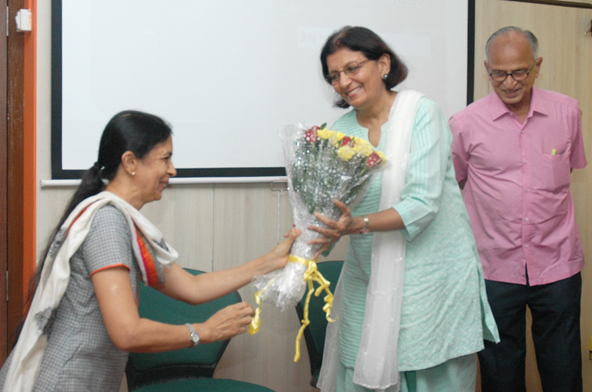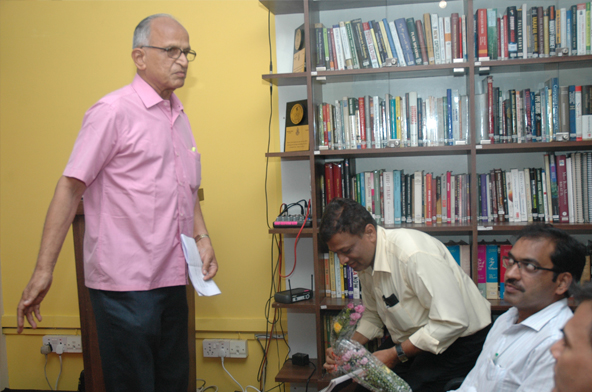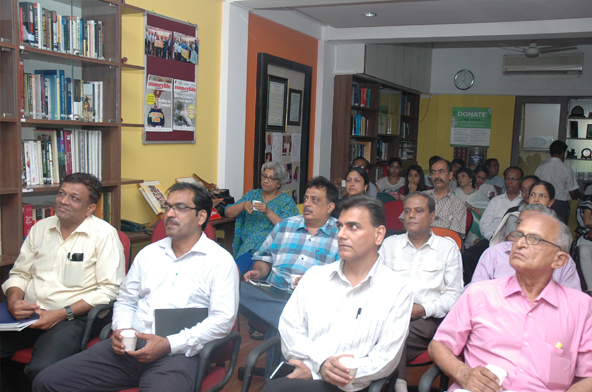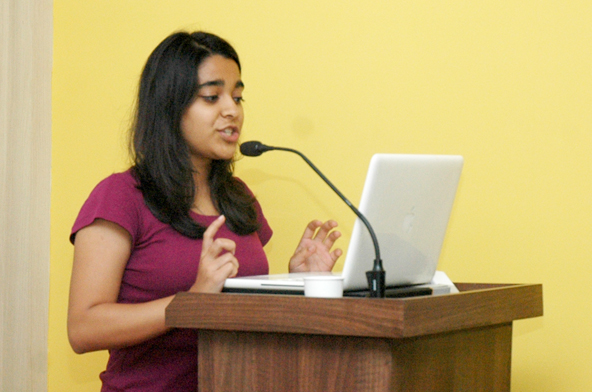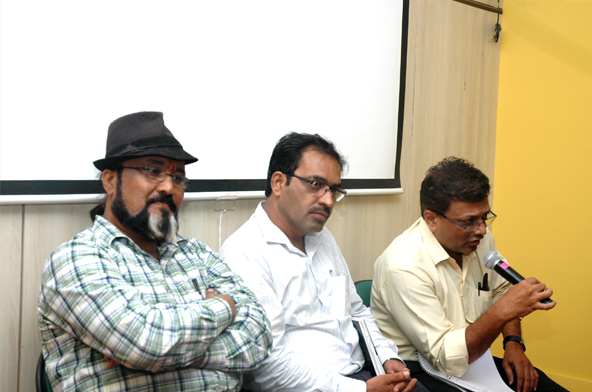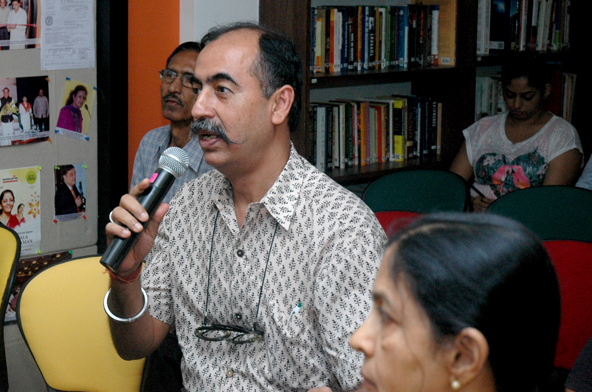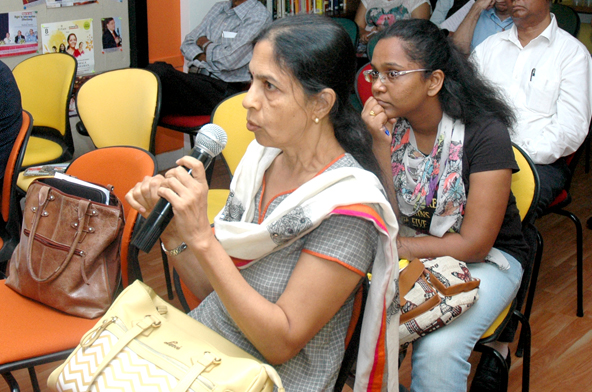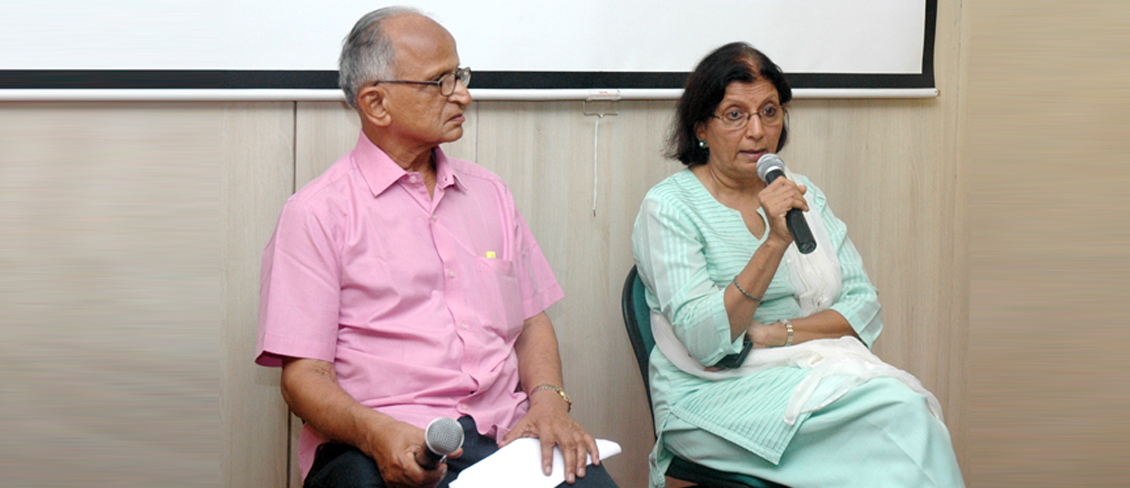
An interaction between citizens and municipal officers of G-North and G-South ward led to a several interesting suggestions and thoughts on how citizens can collaborate in making Mumbai clean and green. The crux of it, however, was the need for greater engagement by citizens and a willingness to work together with the authorities, instead of indulging in a one-sided blame game. The session started with a presentation and case study on what has worked in one particular ward.
Kunti Oza, a well-known activist, who has been working on the issue of solid waste management for over 25 years made a presentation about how A-Ward, which includes the business district of Nariman point has made significant progress in working together with citizens, educational institutions and business houses to create awareness against litter and in favour of segregation and disposal of waste. She formed the Clean Bombay Foundation in 1992 (subsequently renamed as Clean Mumbai Foundation), which has been actively involved in making Mumbai a clean place. Officials from Brihanmumbai Municipal Corp (BMC) or Municipal Corp of Greater Mumbai (MCGM), Sudhakar Nanote, Asst. Engineer (SWM) and Shashank Thakur, SE (SWM) G-South Ward were also present during the session.
Well-known activist Ashok Ravat set the tone for the session introducing the issue of waste management, and highlighting the importance of segregating waste. Ms Oza enumerated the activities of Clean Mumbai Foundation. She said, “The problem is with education (relating to waste management).”
She added that instilling the right values in children at young age could go a long way in solving the problem of waste management. Educating people could go a long way in highlighting that garbage is a manmade problem, she went on to educate the audience on different types of waste. Stating the importance of treating garbage as a resource, she advised the audience to convert their garbage into compost.
Every person can do his bit by helping in his own way. In one year, a family of four can ensure that 120 kg of waste is recycled just through segregation. A building of 20 apartments can ensure that 2.4 tons is recycled in a year! She said that it was important to generate awareness about global warming.
Shaivi Shah, an intern with Moneylife Foundation, gave a brief pictorial presentation highlighting the contrast in cleanliness levels at different places in G-South and G-North ward. This led to an interaction with Assistant Engineers of G-North and G South Ward on how the community can participate in keeping the city clean.
Mr Shashank Thakur, SE (SWM) from the MCGM (Municipal Corporation of Greater Mumbai) explained that there are three types of waste – dry, wet and domestic hazardous waste. He added that the willingness of people to do something actively for waste is less. Composting is one of the methods to recycle waste. There are different methods of composting. Pot composting (aerobic method), vermicomposting and Bokashi method are some of the methods of composting. For instance, in aerobic method, you put your dry and wet waste in different containers. Once the wet waste container is full, put its contents into the first compost pot. You can then add dried leaves of the same quantity as the waste. You can then add the semi-composted material, buttermilk or cow dung to start off the decomposition process. Turn the pile around every other day. Once full, the pot has to be kept open for 30-45 days. After two months, the waste will turn into rich compost that can be used or sold as manure. Though there are different methods of composting, Mr Thakur said, “Whatever way you like (it), do it.”
Plastic recycling is also extremely critical as it is non-biodegradable. A technique known as Pyrolysis process can convert plastic into a useful fuel. Using this technique, any type of plastic waste can be broken down into smaller molecules. The output derived from the process is known as bio fuel. Similarly, heat compression and thermal depolymerisation techniques are used in certain countries
The speakers explained the operational aspects of workings of waste management by the authorities. The speakers stated that change in culture takes time, but it will definitely happen.
Mr Thakur stated, “Don’t believe that things can’t change. Be optimistic. Our future is bright.”
An interactive Q&A session followed where questions on a number of issues such as expandable polystyrene (EPS) or thermocol waste, which is not biodegradable, and what could be done to reduce such waste were answered. On the question of what the citizens could do to reduce the problem of waste, Mr Thakur reiterated the importance segregation of waste, which is also the key to bring down cost of transportation etc.
But again, the MCGM officials expressed their willingness to work with people and urged citizens of G-North and G-South to create Advanced Locality Management (ALMs) that could work with them and be suitably empowered to keep tabs on cleanliness. There was also some discussion on incentivising housing societies, who create space for segregation and are able to dispose all their waste in-house. There are a couple of societies already doing this work, the best known of these is Marathon Era Cooperative Housing Society in Lower Parel, Mumbai, which treats over 300 kgs of garbage generated everyday in-house and does not even need garbage truck going to the society. He said this can be replicated by many of the bigger societies in Mumbai as well.


